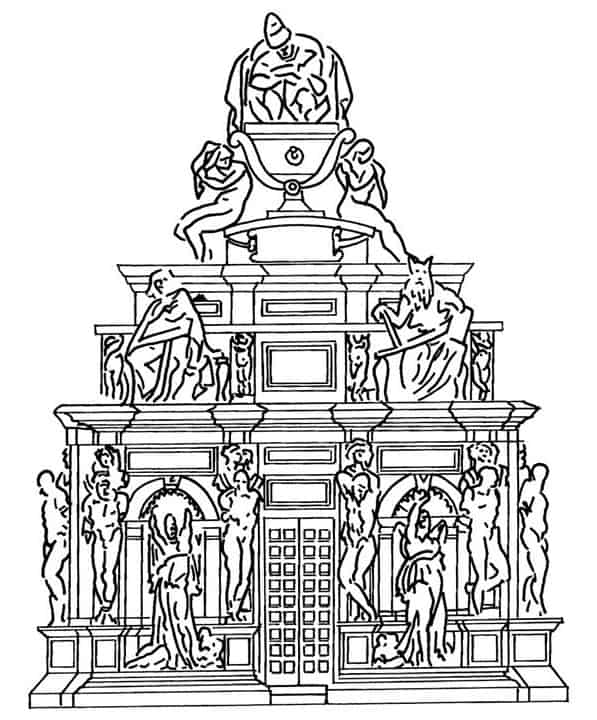SALA WIĘŹNIÓW
W dziewiętnasty wiek, ta sala ( Sala więźniów ) wystawiono starożytne obrazy z różnych kolekcji, a później Michał Anioł tutaj eksponowano niedokończone posągi, tworząc spójną trasę, która zakończyła się Michał Anioł Dawid w centrum Trybuna.
Ta sala zawdzięcza swoją nazwę czterem duże rzeźby męskich nudystów zwanych Niewolnicy, Więźniowie, Lub Jeńcy. Zostały one rozpoczęte przez Michał Anioł jako część jego wspaniały projekt dla grób papieża Juliusza II z Rovere.
Miał to być najwspanialszy grobowiec Czasy chrześcijańskie, zawierający więcej niż 40 figureki został oddany do użytku w 1505, przed Kaplica Sykstyńska (1508)Uważa się, że czterech więźniów są rzeźbione na filarach pod grobowcem, które będą eksponowane w wielka Bazylika św. Piotra W Rzym.
Podczas miesięcy spędzonych w Kamieniołomy Carrara, Michał Anioł starannie wybrano najjaśniejszy marmur, oznaczając każdy blok trzema okręgami. papież nakazał mu odroczenie projektu budowy grobu 1506 z powodu braku funduszy.
Poniżej znajduje się zdjęcie Michał Anioł rekonstrukcja Grobowiec Juliusza II (1 projekt) z 1505.
KILKA ZDJĘĆ Z SALI WIĘŹNIÓW




Rekonstrukcja projektu wg. Michał Anioł dla Grobowca Juliusza II z datą 1505 (1. projekt). Inspirowana rekonstrukcja F. Russoliego, 1952
Później, po śmierci papieża w 1513, W 1521i na koniec w 1534, kiedy Więźniowie nie były już częścią projektu, oryginalny projekt został zmniejszony do skromniejszych rozmiarów.
Michał Anioł siostrzeniec Leonardo Buonarroti przekazał więźniom i Zwycięstwo mieści się w Pałac Vecchio dzisiaj do Książę Cosimo Ja Medyceusze po śmierci artysty.
Więźniowie były przechowywane w Grota do 1908 roku, a następnie przeniesiony do Galeria Accademia.
Kim są więźniowie w Galerii Accademia?
Galeria Accademia we Florencji ma urzekający korytarz prowadzący do słynnego arcydzieła, Davida, stworzonego przez utalentowanego Michała Anioła. Wzdłuż tego korytarza, dumnie umieszczonego, odkryjesz cztery majestatyczne rzeźby stworzone przez tego samego utalentowanego artystę. Te niezwykłe dzieła, znane jako „Więźniowie" Lub "Niewolnicy”, przedstawiają cztery wspaniałe męskie postacie, pieczołowicie wyrzeźbione w blokach marmuru. Warto zauważyć, że te posągi są oszałamiającymi przykładami niedokończonych arcydzieł Michała Anioła.
Zarezerwuj bilety lub wycieczki z przewodnikiem do Galerii Accademia 2024
Należy pamiętać, że ta strona zawiera linki afiliacyjne do produktów i usług stron trzecich
Linki, które mogą okazać się przydatne
Bilety i wycieczki
Wycieczki z przewodnikiem
Bilety bez kolejki do Galerii Accademia
Blog
Galeria Accademia
Informacje dla odwiedzających
Godziny otwarcia
Bilety i wycieczki
Accademia Online
Radio Akademia
Atrakcje Florencji
Galeria Uffizi
Katedra we Florencji
Pałac Pitti
Więcej atrakcji Florencji

